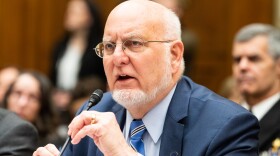
Carrie Feibel
Carrie Feibel is a senior editor on NPR's Science Desk, focusing on health care. She runs the NPR side of a joint reporting partnership with Kaiser Health News, which includes 30 journalists based at public radio stations across the country.
Previously, Feibel was KQED's health editor in San Francisco and the health and science reporter at Houston Public Radio. She has covered abortion policy and politics, the Affordable Care Act, the medical risks of rodeo, the hippie roots of the country's first "free clinic" and the evolution of drug education in the age of legal weed.
Feibel graduated from Cornell University and has a master's degree in journalism from Columbia University. In her print career, she worked at The (Bergen) Record and the Herald News in New Jersey, the Houston Chronicle and the Associated Press. She is currently a board member of the Association of Health Care Journalists.
Feibel was part of the coverage of Hurricane Ike, for which the Houston Chronicle was named a Pulitzer Prize finalist. At KQED, she edited a half-hour radio show on U.S. refugee policy that won an award in explanatory journalism from the Society of Professional Journalists.
-
COVID-19 has now killed more Americans than WWII. That fact helps some people put the viral death toll in perspective, while others find it offensive. Historically, is it even a valid comparison?
-
Last spring, nurses and doctors traveled to New York and other COVID-19 hot spots to help overwhelmed hospitals. But with the virus spreading everywhere, hospitals now have nowhere to turn for help.
-
After weeks of keeping a low profile, the CDC's Dr. Robert Redfield tells NPR that data will determine future recommendations for wearing masks or easing back on social distancing.
-
Many new plans created under Obamacare have consumers and doctors scrambling to figure out which providers accept which plans, and what services are covered.
-
Texas this week approved regulations that require training and background checks for people who help consumers navigate the Affordable Care Act. But the federal government already requires this kind of trainign. KUHF's Carrie Feibel reports that Texas officials say the rules protect the consumer, while others say it is yet another way to thwart Obamacare.
-
The insurance commissioner in Texas has toughened regulations covering the workers helping people sign up for health coverage under the Affordable Care Act. Texas officials say the regulations are needed to protect consumer privacy. Supporters of the health law say they're an attempt to thwart Obamacare.
-
Going without insurance would be a gamble. But the high deductibles of Affordable Care Act plans make them a hard sell for Tammy Boudreaux. If her health holds up, she could skip insurance, pay a penalty and still save a couple of hundred dollars a month.
-
The push to get women to breast-feed has been so successful that many mothers who can't do it are looking for other mothers' extra milk. Milk banks that pasteurize and sell donated breast milk have sprung up. Informal online swapping of extra mother's milk has become popular, despite quality concerns.
-
In Oregon, the online health marketplace isn't working for people looking to buy individual policies. But the state has been rapidly expanding Medicaid anyway. In Texas, insurance helpers may face state regulations that would make it even harder to assist people seeking coverage.
-
Leading Texas politicians have resisted the federal health care law. But in Houston, community groups and public health agencies are trying to educate the city's 800,000 uninsured residents about new coverage options.









